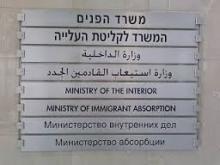Module 6: The Right to Citizenship
320px-Languages_of_Israel.jpeg

Part 1: The Israeli Nationality Law (1952) and the Citizenship and Entry Into Israel Law (2003)
This module opens with a brief recap of the material covered in Module 5: The Law of Return. The focus then shifts to other ways in which one can be granted Israeli citizenship and addresses the rights of non-Jewish citizens of Israel.
Activity #1: Discussion of the Israeli Nationality Law (1952) (15-20 min.)
A. Explaining Israeli citizenship through Israel's Nationality Law (1952)
- Ask the participants if they are familiar with ways for non-Jews to become citizens of Israel.
- Ask about naturalization. If they are not familiar, define it for them as the process of becoming a citizen of a particular country and explain that every country has its own rules about naturalization. Over the next sessions, we will be looking at the process of naturalization in the U.S. and Israel through a particular context.
- Note that citizenship - in Israel as well as the US - affords the right to family re-unification. An Israeli citizen can apply to bring his or her family members from abroad and facilitate their becoming citizens too. This is considered a hallmark of democracy. Explore how this is applied in Israel.
B. Review the Citizenship and Entry into Israel Law (2003)
- Read the pertinent information in Handout 6a.
- Pose the discussion questions to make sure participants understand the law.
C. Poll Gut Reactions to the Citizenship and Entry Into Israel Law (2003)
- Ask participants to share their initial reactions to the law and whether or not it seems fair.
- Bring it back to the “Jewish and democratic” question once again.
Activity #2: Small Group Discussions of the Citizenship and Entry Into Israel Law (15 minutes)
Divide participants into groups of 2-4 people and ask them to discuss the Citizenship and Entry Into Israel Law. Using Handout 6a as a resource and guide, each group should come to judgment on whether or not the Citizenship and Entry Into Israel Law (2003) is compatible with Israel as a Jewish and democratic state. Groups should look for examples from U.S. immigration history to bolster their positions, and be prepared to share their views when the large group reconvenes.
Activity #3: Large-Group Discussion (15 minutes)
When the group reconvenes, moderate a discussion in which representatives of the small groups share their views. Encourage presenters to go beyond "thumbs up" or "thumbs down" on the law, and to provide examples and explanations of how they reached their conclusions. You can opt to run this discussion as a series of sharings, as a debate, or in another style. Conclude by summing up the discussion and challenging participants to take their exploration further as homework: think further about the issues raised in this group discussion and supplement with additional research as needed. Prepare a one-page argument either supporting or opposing the Citizenship and Entry Into Israel Law and be prepared to defend your views at our next meeting.
Part 2: The Rulings of the Justices in Upholding the Citizenship and Entry Into Israel Law and Connections to U.S. Immigration History
In this section we will be working with Handout 6b.
Activity #1: Homework Discussion in Small Groups (20-25 min.)
A. Collaborative Small-Group Learning Activity
- Divide participants into groups of 3-4 people. It is important that each group have proponents and opponents of the law to balance the discussion.
- In each group, have each person present their homework and make their case.
- Have them work on the discussion questions in Handout 6b and agree to a unified position and a unified set of arguments. If they cannot agree, then have a majority opinion and a minority one.
B. Group Presentations and Wider Discussion
- Have some of the groups present their opinions and arguments.
- Keep track of some of these arguments on the board.
- Hear from at least two groups on each side.
C. Connections to U.S. Policy
Ask the group what connections, if any, they see with U.S. immigration history and policy. Possible directions to take this discussion:
- How does democracy change and evolve over time?
- Is it in Israel’s interest to mirror U.S. policy? Why? Why not?
- Why does the U.S. restrict immigration and should the same considerations apply to Israel?
- Why is it useful to compare the two?
- Why is it not useful to compare the two?
Transition to the Israeli High Court decisions – what do the Justices think?
Activity #2: Reading/Discussing the High Court Decisions (15-20 min.)
A. Read the decision excerpts aloud
Actively read and discuss each of the excerpts in Handout 6b.
B. Address the Discussion Questions in Handout 6b
- Encourage each participant to commit to a position and defend it.
- Reasons to uphold the law:
- SECURITY: prior to the law's passage, terrorists and suspected terrorists could gain access to Israel by marrying Israeli Arabs.
- JEWISH STATE: allowing Arab spouses to live in Israel may eventually erode the Jewish majority in the Jewish state.
- LOYALTY: some Arab spouses may not be loyal to Israel and may reject its status as a Jewish state.
- Reasons to reject the law
- FAMILY LIFE: a basic constitutional principle of any democracy is to allow families to be together.
- SLIPPERY SLOPE: what else can be justified out of fear?
- Reasons to uphold the law:
- Encourage the group to identify essential points and prioritize effectively.
C. Transition to the Concluding Discussion and Reflection
Return the conversation to the broader one about Israel as a Jewish and a democratic state.
Concluding Discussion and Reflection (10-15 min.)
A. Redirect the Conversation Back to the Jewish/Democratic Aspects
- Pose the final discussion questions on Handout 6b.
- Help each participant crystallize his or her position.
- Ask everyone to justify their positions based on their personal core values.
- Is their Judaism what’s most important?
- Is their commitment to democracy more important?
- If they say that Judaism and democracy are equally important, do they believe the two can be reconciled?
- What factors shape their beliefs in response to the three questions above?
B. Concluding Writing Reflection
- Read the prompt aloud and have everyone spend some time responding to it.
- If they do not finish, it becomes homework.
Homework for Next Class:
Have participants finish their reflection if they haven’t finished it in class.
The written reflection at the end of this module can serve as a basis for rich discussion as you ask the group to share their ideas and engage in respectful dialogue.


